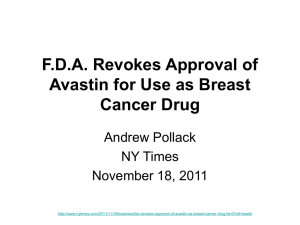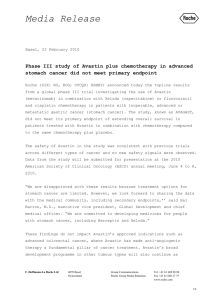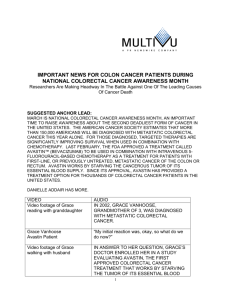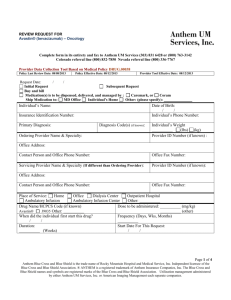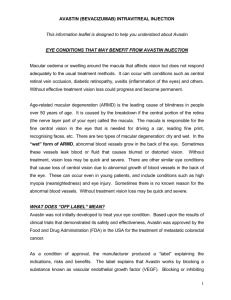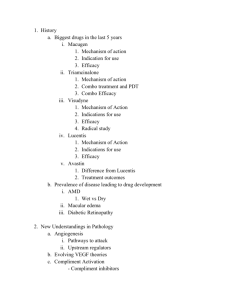(English - doc) File size=58 Kb
advertisement
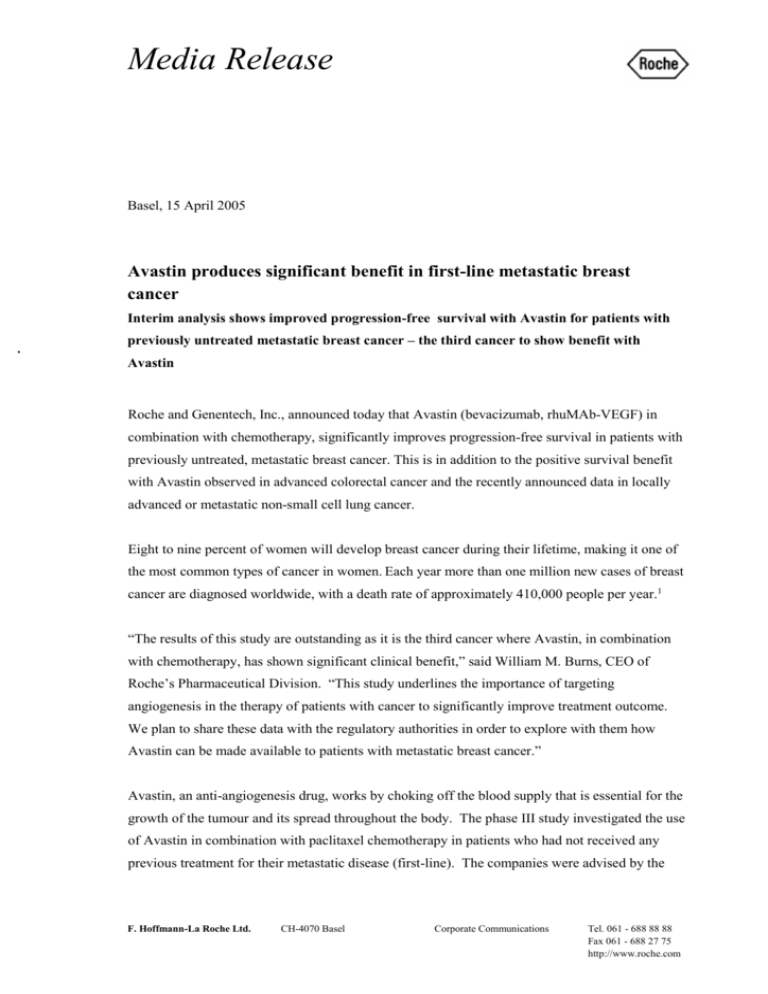
Media Release Basel, 15 April 2005 Avastin produces significant benefit in first-line metastatic breast cancer Interim analysis shows improved progression-free survival with Avastin for patients with previously untreated metastatic breast cancer – the third cancer to show benefit with Avastin Roche and Genentech, Inc., announced today that Avastin (bevacizumab, rhuMAb-VEGF) in combination with chemotherapy, significantly improves progression-free survival in patients with previously untreated, metastatic breast cancer. This is in addition to the positive survival benefit with Avastin observed in advanced colorectal cancer and the recently announced data in locally advanced or metastatic non-small cell lung cancer. Eight to nine percent of women will develop breast cancer during their lifetime, making it one of the most common types of cancer in women. Each year more than one million new cases of breast cancer are diagnosed worldwide, with a death rate of approximately 410,000 people per year.1 “The results of this study are outstanding as it is the third cancer where Avastin, in combination with chemotherapy, has shown significant clinical benefit,” said William M. Burns, CEO of Roche’s Pharmaceutical Division. “This study underlines the importance of targeting angiogenesis in the therapy of patients with cancer to significantly improve treatment outcome. We plan to share these data with the regulatory authorities in order to explore with them how Avastin can be made available to patients with metastatic breast cancer.” Avastin, an anti-angiogenesis drug, works by choking off the blood supply that is essential for the growth of the tumour and its spread throughout the body. The phase III study investigated the use of Avastin in combination with paclitaxel chemotherapy in patients who had not received any previous treatment for their metastatic disease (first-line). The companies were advised by the F. Hoffmann-La Roche Ltd. CH-4070 Basel Corporate Communications Tel. 061 - 688 88 88 Fax 061 - 688 27 75 http://www.roche.com trial group conducting the study, that an interim analysis of the study showed that it met its primary efficacy endpoint of improving progression-free survival, the length of time the cancer is stable, compared to chemotherapy alone. About the study This is the first phase III study to evaluate Avastin in combination with chemotherapy for the first-line treatment of metastatic breast cancer. This randomised, controlled, multi-centre study enrolled 722 women with previously untreated metastatic breast cancer. The study was sponsored by the National Cancer Institute (NCI), part of the National Institutes of Health, and conducted by a network of researchers led by the Eastern Cooperative Oncology Group (ECOG). The patients were randomised to receive treatment with paclitaxel with or without Avastin. Patients with HER2-positive metastatic breast cancer were not enrolled in the study unless they had received prior treatment with Herceptin (trastuzumab) or were unable to receive treatment with Herceptin. Patients who had received adjuvant paclitaxel within the previous 12 months and patients with a prior history of blood clots or who were receiving blood thinners were also excluded from the study. According to ECOG, data from this study will be submitted to an upcoming medical meeting. Preliminary analysis of the data shows that adverse events in this study were similar to those observed in previous clinical trials with Avastin in combination with chemotherapy in metastatic breast cancer. About Avastin Avastin is the first treatment that inhibits angiogenesis – the growth of a network of blood vessels that supply nutrients and oxygen to cancerous tissues. Avastin targets a naturally occurring protein called VEGF (Vascular Endothelial Growth Factor), a key mediator of angiogenesis, thus choking off the blood supply that is essential for the growth of the tumour and its spread throughout the body (metastasis). In Europe, Avastin is approved for first-line treatment of patients with metastatic carcinoma of the colon or rectum in combination with the chemotherapy regimens of intravenous 5fluorouracil/folinic acid or intravenous 5-fluorouracil/folinic acid/irinotecan. Avastin received fast-track approval by the US Food and Drug Administration (FDA) and was launched in the US in February 2004.* 2 In the pivotal Phase III study, the addition of Avastin to chemotherapy (irinotecan/5fluorouracil/leucovorin) significantly extended survival by, on average, five months (20.3 months versus 15.6 months) for people with previously untreated metastatic colorectal cancer. Avastin also significantly increased the amount of time the cancer was not growing compared with patients receiving chemotherapy alone (10.6 months vs. 6.2 months).2 In a second Phase III study, conducted by the Eastern Cooperative Oncology Group (ECOG), Avastin was also shown to significantly improve survival when added to another widely prescribed chemotherapy regimen (oxaliplatin/5-fluorouracil/leucovorin). With Avastin, people who had previously failed one chemotherapy regimen for their advanced disease, lived nearly two months longer, on average, compared to those who received chemotherapy alone (12.5 months vs. 10.7 months).3 People with very advanced colorectal cancer who are too unwell to tolerate traditional aggressive chemotherapy also benefit from Avastin. The addition of Avastin to a less aggressive form of chemotherapy increased the length of time the cancer was not growing, by four months, compared to chemotherapy alone (a 67 percent increase in progression-free survival).4 Roche and Genentech are pursuing a comprehensive clinical programme investigating the use of Avastin in advanced colorectal cancer with other chemotherapies and also expanding into the adjuvant setting (post operation). As its mechanism may be relevant in a number of malignant tumours, Roche and Genentech are also investigating the potential clinical benefit of Avastin in pancreatic cancer, ovarian cancer, renal cell carcinoma and others. Approximately 15,000 patients are expected to be enrolled into clinical trials over the next years worldwide. About Roche Headquartered in Basel, Switzerland, Roche is one of the world’s leading research-focused healthcare groups in the fields of pharmaceuticals and diagnostics. As a supplier of innovative products and services for the early detection, prevention, diagnosis and treatment of disease, the Group contributes on a broad range of fronts to improving people’s health and quality of life. Roche is a world leader in diagnostics, the leading supplier of medicines for cancer and transplantation and a market leader in virology. In 2004 sales by the Pharmaceuticals Division totalled 21.7 billion Swiss francs, while the Diagnostics Division posted sales of 7.8 billion Swiss francs. Roche employs roughly 65,000 people in 150 countries and has R&D agreements and strategic alliances with numerous partners, including majority ownership interests in Genentech and Chugai. Additional information about the Roche Group is available on the Internet (www.roche.com). 3 All trademarks used or mentioned in this release are legally protected. Further information: Genentech: www.gene.com Cancer: www.health-kiosk.ch Roche in Oncology: http://www.roche.com/pages/downloads/company/pdf/mboncology05e_a.pdf Media Relations Contacts Phone: +41 61 688 88 88 / e-mail: basel.mediaoffice@roche.com - Baschi Dürr - Alexander Klauser - Daniel Piller (Head Roche Group Media Office) - Katja Prowald (Head Science Communications) - Martina Rupp Note for editors * In the US, Avastin is approved for use in combination with intravenous 5-fluorouracil-based chemotherapy, for firstline treatment of patients with metastatic carcinoma of the colon or rectum. References: 1. J. Ferlay, F. Bray, P. Pisani and D.M. Parkin. GLOBOCAN 2002: Cancer Incidence, Mortality and Prevalence Worldwide IARC CancerBase No. 5. version 2.0, IARCPress, Lyon, 2004. 2. Hurwitz H, Fehrenbacher L, Novotny W, et al. Bevacizumab plus Irinotecan, Fluorouracil, and Leucovorin for Metastatic Colorectal Cancer. New England Journal of Medicine 2004; 350(23): 2335–2342. Mitchell EP, Alberts SR, Schwartz BJ, et al. High-dose bevacizumab in combination with FOLFOX4 improves survival in patients with previously treated advanced colorectal cancer: Results from the Eastern Cooperative Oncology Group (ECOG) study E3200. ASCO Gastrointestinal 2005 Cancer Symposium, January 2005 (abstract 169a). Kabbinavar FF, Joseph Schulz J, McCleod M, et al. Addition of Bevacizumab to Bolus 5-FU/Leucovorin in FirstLine Metastatic Colorectal Cancer: Results of a Randomized Phase II Trial.) J Clin Oncol 23:10.1200/JCO.2005.05.112, 2005. 3. 4. 4
